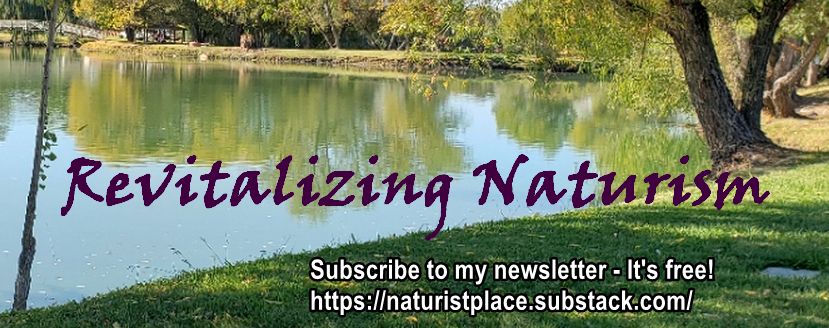
I’ve wanted to address this topic for some time. This post from Naked Wanderings presents an excellent excuse to do that: Why the Whole World Needs to Know that You’re a Naturist
You should read the post, but I’ll try to summarize it in my own words.
- Most naturists firmly believe their enjoyment of nudity is a really great thing, for many reasons. But they feel badly misunderstood and viewed as nutcases, weirdos, or perverts by a large majority of non-naturists.
- Because of the expected disapproval of social nudity by so many non-naturists, devotees of naturism tend to be pretty secretive about their enjoyment of nudity, and discuss it with very few – if any – people they know.
- But this inclination to be secretive about enjoying nudity on the part of naturists is actually a major source of the misunderstanding by non-naturists. It’s hardly surprising they misunderstand when naturists avoid explaining, or even admitting, their enjoyment of social nudity.
- It’s only natural for people to be suspicious of activities that others engage in but are secretive about or try to hide. Surely, in that case, there’s probably something wrong or shameful with an activity that people don’t want to acknowledge or discuss.
- There must be good reasons why nudity is a serious taboo in most contemporary societies. Why else would it seem so important to cover at least certain parts of one’s body – or even most of it – nearly all the time? But naturists seem reluctant to explain why they dispute the reasons for the taboo.
- Naturists seem to hide their lifestyle for much the same reasons that most people want to hide some or most of their bodies – namely that it would be embarrassing or shameful not to hide them.
- There’s a widespread perception that it’s mainly “old, fat men” who try to defend the idea of being socially naked with others. Because these old farts (“Boomers”) just don’t care anymore what others think. There seem to be few naturists not in that category to dispute the perception – out of fear of revealing their own naturism.
- If naturists remain secretive, their freedom to enjoy naturism will be probably be limited. A few days spent at a naturist resort could be difficult to explain to friends who wonder where they were. Making up false stories that risk being disconfirmed could damage relationships. To avoid having to reveal the truth, good opportunities for explaining social nudity would be missed.
- Enjoying naturism and social nudity is not shameful at all, but instead something to be proud of. It demonstrates, for example, self-confidence and possession of courage to live by principles that society unjustly disparages. A reasonable amount of pride in how one lives is a valuable, positive feeling.
- Revealing one’s enjoyment of social nudity to enough people will probably result in a few of them admitting that they too have had good naturist experiences that they’d avoided disclosing. At least 10% of the population – maybe far more – have enjoyed nudity at home or skinny-dipping. Openly discussing naturism is an excellent way to find new naturist friends.
- The more positive experiences you have when you reveal an interest in naturism, the less you’ll hesitate to do so. And you’ll have answers for the usual objections and misconceptions. So explaining a love of being clothesfree becomes increasingly easy. Think of the familiar saying that “the truth can set you free”.
- The general public, at least in most countries, believes that naturists are very rare in the population, and the few who admit it risk being stigmatized. That false belief is enough to deter most people from even considering the possibility of investigating social nudity.
- When a person learns that someone they know well and respect is a naturist, there’s a good chance they’ll want to find out much more about it – and maybe even give it a try. They’ll also know who’s a fine person to be naked with. And when they tell others about this newfound interest, they’ll know who to recommend for more information.
So, in a nutshell, there’s one big reason that being secretive about enjoying naturism is a major problem: the secrecy allows terrible misunderstandings of what naturism is.
This whole discussion can actually be summarized much further in just a few sentences that are easier to remember:
- Most naturists are too secretive about their interest in nonsexual social nudity. Therefore, most others don’t realize they quite possibly know one or more naturists, so they wrongly assume naturism is a much less common interest than it actually is.
- Being secretive also implies naturists are ashamed of their enjoyment of social nudity. So most people assume that even if someone they know is a naturist, that person doesn’t talk about it because of feeling embarrassment and shame. (And they might be right.)
- Being secretive about enjoying nudity prevents explaining that naturism isn’t a sexual perversion, but instead it’s wholesome, healthy, and life-enhancing – with considerable psychological benefits. If naturists don’t openly extol what they do, others are unlikely to be persuaded of its value.
- Talking about naturism helps normalize it, because people realize that their acquaintances who enjoy nudity aren’t kooks or weirdos, but instead are normal, sensible individuals with good judgment. Also, there are many more equally “normal” naturists around than had been assumed.
But wait! There’s more!
There’s an additional very significant reason that secrecy is really bad for naturism. It’s a serious problem that drastically curtails spreading the popularity of naturism. If someone is mostly secretive about enjoying social nudity, it’s far more difficult to find others who feel the same way. A naturist who doesn’t discuss the subject openly is unlikely to realize that others among his/her acquaintances are also naturists who’re making the very same mistake.
Sociologists know that the average person has perhaps 100 to 150 acquaintances that are known by name and are likely to be interacted with somewhat regularly. This includes family and friends, but also others, for example, who work in the same place or live in the same neighborhood. (For simplicity, we’re not even discussing here “friends” you may have never met but “know” only online.) Even if only a few percent of these people have ever had some naturist experience, they’ll never be aware of what they have in common if naturism is never discussed.
It’s at this point that some understanding of “social networks” is useful. Not only does each of us have over 100 acquaintances, but most others in our group of acquaintances do also. And all these groups overlap only partially, perhaps not even very much. Not only are there “friends of friends” who you hardly know if at all. But there are also a great many “acquaintances of acquaintances” you certainly do not know. Relationships like this are said to be of “second degree” – and there could be thousands of them for any one individual.
So suppose there’s only one individual (besides yourself) among your acquaintances who has naturist experience. And that person, likewise, has a different acquaintance with naturist experience. Clearly, if all these folks with naturist experience could discover each other, there would be plenty in almost any community to form a very nice naturist club that could frequently enjoy social nudity together.
But that great naturist club just will not happen if hardly any of these people discuss naturism openly with others they don’t necessarily know very well.
And there’s one more interesting factor here. It’s quite possible that there are several people among your acquaintances who are open-minded enough to seriously consider the idea of exploring naturism. However, because our society has such negative attitudes towards nudity and naturism, one single person may not be enough to convince someone else who might be interested to actually try naturism. It might take two or more naturists to make that happen.
In other words, that possibly persuadable person will need to have at least two acquaintances who are encouraging him or her to explore naturism. And that’s likely to happen only if current naturists are open enough about their interest so that all the right people can get together.
This is too brief an explanation of how naturism can spread in social networks, so I’ll be writing more about the subject.
I have mentioned social networks before in other articles. If you’d like to check them out now, here they are:

I totally agree on everything. I have wanted to be a naturist for years but I was shy about it. But unfortunately I’m one of those old men now.But since I’ve come out of the closet so to speak two years ago I talk to everybody about it. The funny thing is is I’m not uncomfortable talking about most of the people I tell are. But I get a lot of good responses too. So the best thing I feel to do is just tell people and let them figure it out from there. Thank you Jay Johnson. Sacto. Ca.